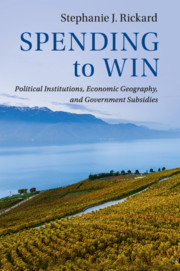Book contents
- Spending to Win
- Political Economy of Institutions and Decisions
- Spending to Win
- Copyright page
- Dedication
- Contents
- Figures
- Tables
- Acknowledgments
- 1 Who Gets What and Why?
- 2 The Uneven Geographic Dispersion of Economic Activity
- 3 How Institutions and Geography Work Together to Shape Policy
- 4 Explaining Government Spending on Industrial Subsidies
- 5 The Power of Producers
- 6 Why Institutional Differences among Proportional Representation Systems Matter
- 7 The Policy Effects of Electoral Competitiveness in Closed-List PR
- 8 Conclusion and Implications
- References
- Index
- Series page
7 - The Policy Effects of Electoral Competitiveness in Closed-List PR
Published online by Cambridge University Press: 12 April 2018
- Spending to Win
- Political Economy of Institutions and Decisions
- Spending to Win
- Copyright page
- Dedication
- Contents
- Figures
- Tables
- Acknowledgments
- 1 Who Gets What and Why?
- 2 The Uneven Geographic Dispersion of Economic Activity
- 3 How Institutions and Geography Work Together to Shape Policy
- 4 Explaining Government Spending on Industrial Subsidies
- 5 The Power of Producers
- 6 Why Institutional Differences among Proportional Representation Systems Matter
- 7 The Policy Effects of Electoral Competitiveness in Closed-List PR
- 8 Conclusion and Implications
- References
- Index
- Series page
Summary
- Type
- Chapter
- Information
- Spending to WinPolitical Institutions, Economic Geography, and Government Subsidies, pp. 170 - 198Publisher: Cambridge University PressPrint publication year: 2018



